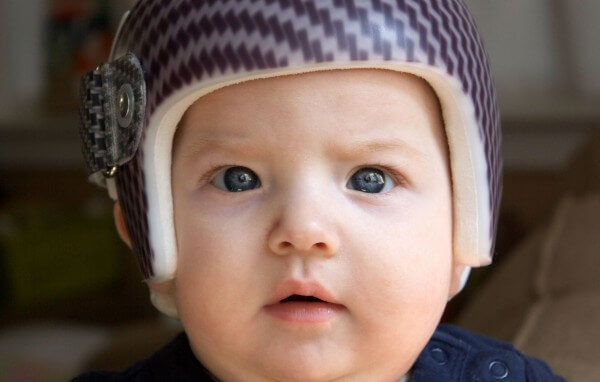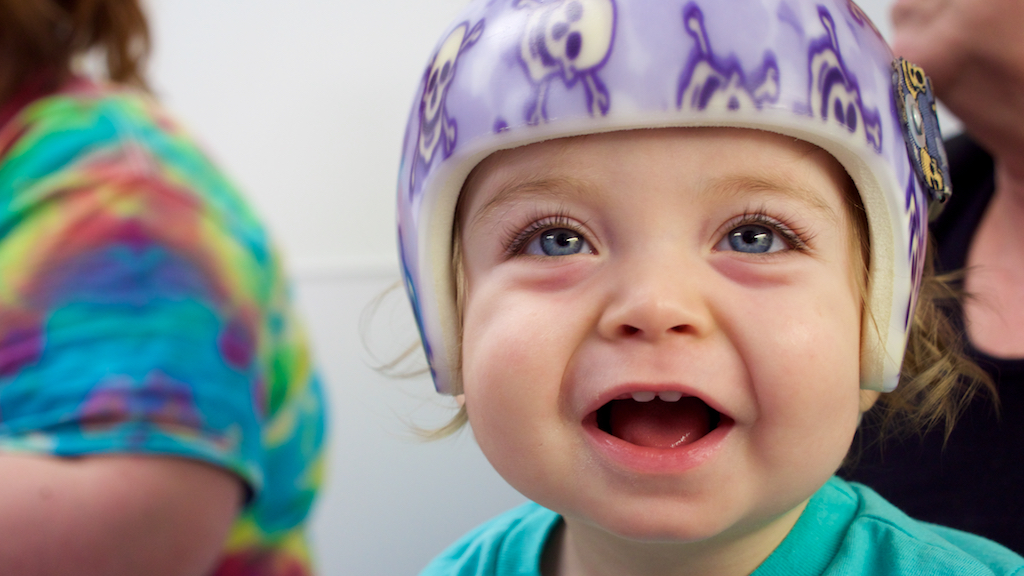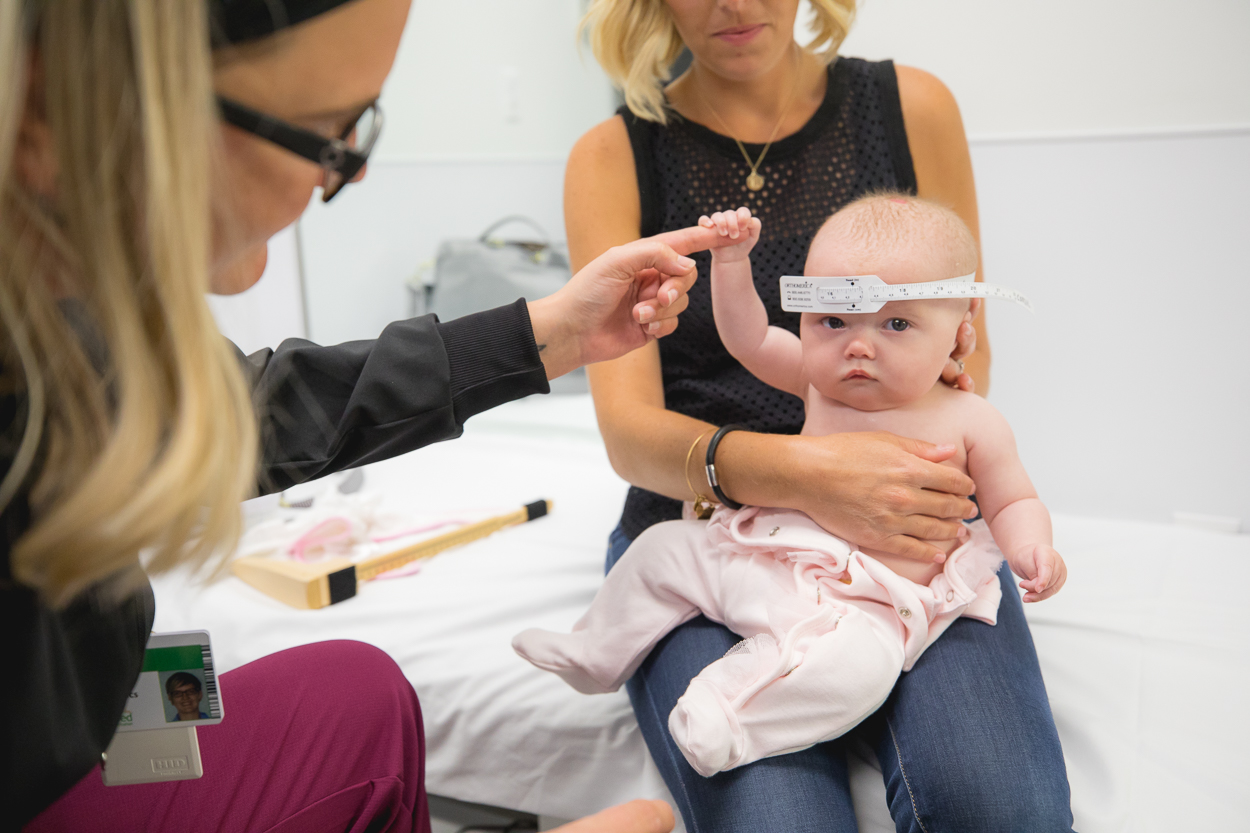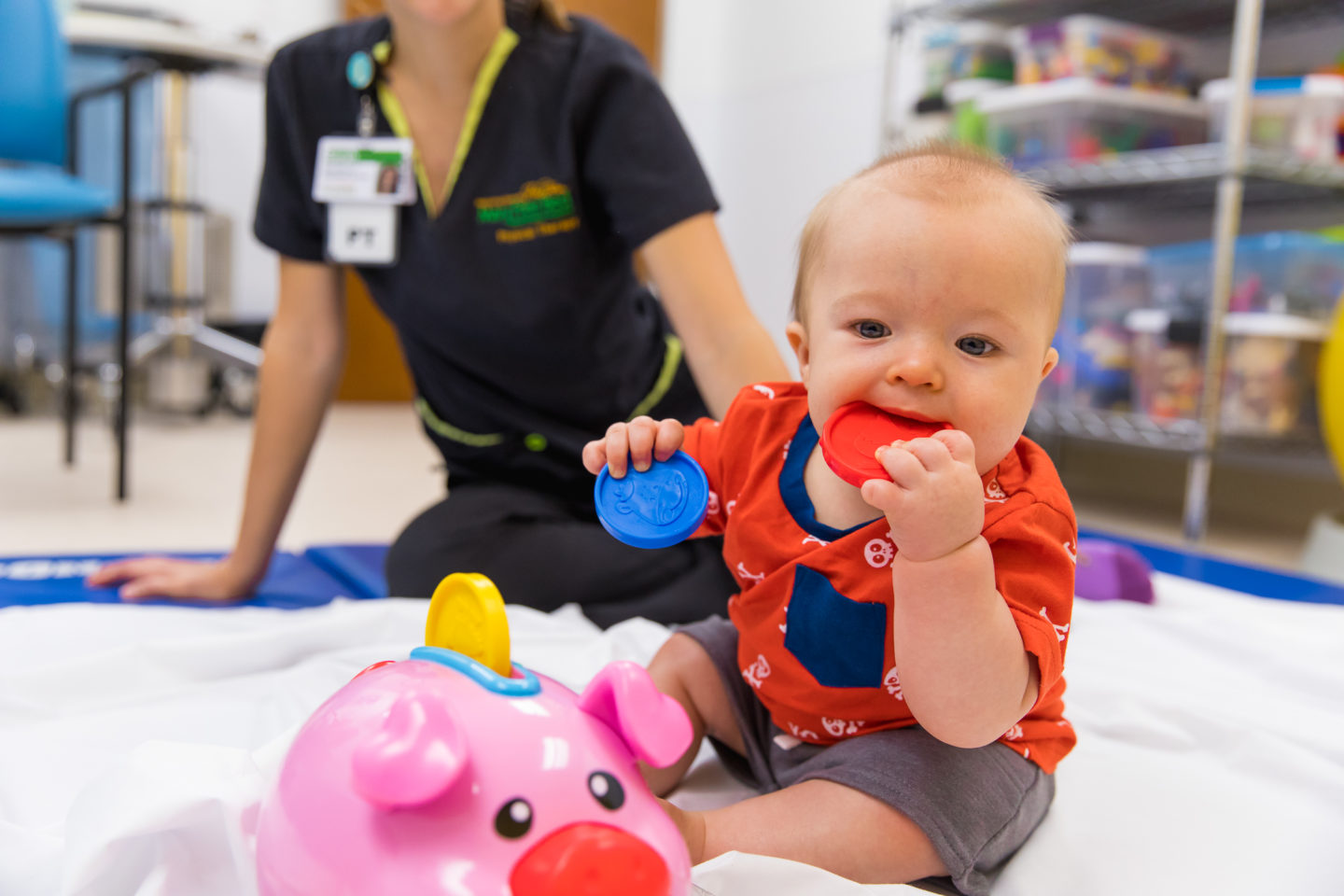
Ensuring the best outcome for your child.
Mary Free Bed Kids offers treatment for children who have deformational plagiocephaly or torticollis. Deformational plagiocephaly is a misshaping or flattening of the head. Torticollis causes problems in the muscles that turn your baby’s head.
Deformational plagiocephaly and torticollis often occur together. Mary Free Beds Kids can address either or both diagnoses, depending on your child’s needs.
Our experienced clinicians can evaluate the asymmetries of your child’s head shape to confirm a plagiocephaly diagnosis. We will give a recommendation for continued repositioning or to move forward with a cranial remolding orthosis.

If your child is also diagnosed with torticollis, we’ll focus on improving neck motion, using arms and legs symmetrically, increasing hand-eye coordination and strengthening core muscles. This will make it easier for your child to develop age-appropriate motor skills.
What is deformational plagiocephaly?
Deformational plagiocephaly is when external forces cause an abnormal shaping of an infant’s skull. This can appear at the time of your child’s birth or in the first few months. Parents and grandparents often are the first to notice this difference in head shape. Talk to your pediatrician if you have questions or concerns about your child.
Common signs of deformational plagiocephaly include:
- Asymmetrical skull shape
- Unilateral occipital flattening (flattening on one side or the back of the head)
- Ear offset (where the ear on the flattened side is in a different position than it should be)
- Facial asymmetry in the eyes, nose and jaw
- An unusually prominent forehead opposite the side with flattening
Torticollis also may be present.

Other forms of deformational plagiocephaly we treat include:
Deformational brachycephaly
- Flat across the back of the head
- Head is also excessively wide compared to the length
- High slope, posterior towering or cone shape
Deformational asymmetrical brachycephaly – A combination of plagiocephaly and brachycephaly
Deformational scaphocephaly – A long narrow head shape; typically much longer than wide
Torticollis and deformational plagiocephaly often occur together, but not always. Mary Free Bed’s program addresses either, or both, diagnoses.
What is torticollis?
Torticollis is a shortening or tightening of the muscle that goes from behind the ear to the front of the neck (called the sternocleidomastoid muscle). This muscle helps your baby turn his or her head and bring his or her ear down to his or her shoulder.
Torticollis can be caused by several things, including:
- Sleep position
- Restrictive positioning in the uterus (common with large or multiple babies)
- Congenital muscular torticollis
- Maternal anatomical conditions
- Birth trauma
- Orthopedic conditions
- Muscle weakness

Why treatment is important
If deformational plagiocephaly or torticollis goes untreated, the long-term effects of these conditions can include gross motor difficulties, vision problems, facial and ear asymmetry and asymmetric jaw development in moderate or severe cases.
We’ll start by ensuring your baby receives a clinical evaluation to determine what, if any, complication exists.
If deformational plagiocephaly or congenital torticollis is confirmed, you can start by repositioning your baby in the opposite direction he or she prefers to look during play and sleep. Also, have your baby spend time on his or her stomach during waking hours and do therapy-directed stretching to loosen tight muscles. Repositioning your baby’s head during sleep also helps redistribute the pressure on his or her skull. An evaluation can help educate you on proper repositioning and tummy-time techniques.
Comprehensive Services
Services available through Mary Free Bed Kids include:
Physician Evaluation
A pediatric physiatrist (a physician who specializes in physical medicine and rehabilitation) will evaluate your child’s symptoms and talk with you about your child’s medical history.
Physical Therapy Assessment
A physical therapist will evaluate:
- Range of motion throughout your child’s body
- Control of shoulder girdle
- Structure and appearance of your child’s face and neck
- Gross motor skills.
Occupational Therapy Assessment
An occupational therapist will assess your child’s range-of-motion, control of shoulder muscles and bones and the structure of his or her face and neck. They will also evaluate your child’s fine motor skills and visual perceptual development.
Coordination with Orthotics
We’ll coordinate with other experts at Mary Free Bed to provide your child with the best possible care. This may include working with our on-site orthotics program for cranial remolding treatment when necessary for cranial reshaping or neck collars when needed for retraining.
Therapy
We’ll monitor your child to ensure he or she is on track to hit developmental milestones and continued healthy patterns for movement.
Physical and occupational therapists work with your child on:
- Stretching exercises
- Increasing gross motor function, with an emphasis on symmetry of movement between the right and left sides of the body
- Neck and trunk righting
- Increasing control of the shoulder’s muscles and bones
- Increasing range of motion in the neck
- Increasing awareness of neglected side
- Manual techniques to relax tight muscles.
Family and Caregiver Education
Family involvement is a key component of our program. Our rehabilitation experts educate you on positioning, stretching and play activities that support your baby’s therapy goals. You’ll receive training and support to ensure your child’s treatment continues at home and in other settings.
Contact Us
Grand Rapids
616.840.8005
800.668.6001
Holland
616.294.4066
616.840.8005



